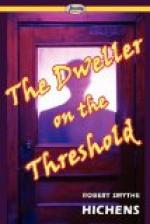But Malling, now with a smiling change to greater lightness and ease, hastened to traverse this statement.
“No, no,” he replied. “For the contemplation of a man by his fellow-men must always be an utterly different thing from his own contemplation by himself. For our fellow-men always remain in a very delightful ignorance of us. Don’t they, Lady Sophia? And so they can never destroy us, luckily for us.”
He had done what he wished to do, and he was now ready for other activities. But he found it was not easy to switch his companions off onto another trail. Lady Sophia, now that he looked at her closely, he saw to be under the influence of fear, provoked doubtless by the subject they had been discussing. Chichester, also, had a look as of fear in his eyes. As to the rector, he sat gazing at his curate, and there had come upon his countenance an expression of almost unnatural resolution, such as a coward’s might wear if terror forced him into defiance.
In reply to Malling’s half-laughing question, Lady Sophia said:
“You’ve studied all these things, haven’t you?”
“Do you mean what are sometimes called occult questions?”
“Yes.”
“I have.”
“And do you believe in them?”
“I’m afraid I must ask you to be a little more definite.”
“Do you believe that there are such things as doubles?”
“I have no reason to believe that there are, unless you include wrongly in the term the merely physical replica. It appears to be established that now and then two human beings are born who, throughout their respective lives remain physically so much alike that it is difficult, if not impossible, to distinguish between them.”
“I didn’t mean only that,” she said quickly.
“You meant the double in mind and soul as well as in body,” said Chichester.
“Yes.”
“How can one see if a soul is the double of another soul?” said Malling.
“Then you think such a story as Mr. Chichester related in his sermon all nonsense?” said Lady Sophia, almost hotly, and yet, it seemed to Malling, with a slight lifting of the countenance, as if relief perhaps were stealing through her.
“I thought it a legitimate and powerful invention introduced to point a moral.”
“Nothing more than that?” said Lady Sophia.
Malling did not reply; for suddenly a strange question had risen up in him. Did he really think it nothing more than that? He glanced at Chichester, and the curate’s eyes seemed asking him to say.
The rector’s heavy and powerful frame shifted in his chair, and his voice was heard saying:
“My dear Sophy, I think you had better leave such things alone. You do not know where they might lead you.”
There was in his voice a sound of forced authority, as if he had been obliged to “screw himself up” to speak as he had just spoken. Lady Sophia was about to make a quick rejoinder when, still with a forced air of resolution, Mr. Harding addressed himself to Chichester.




